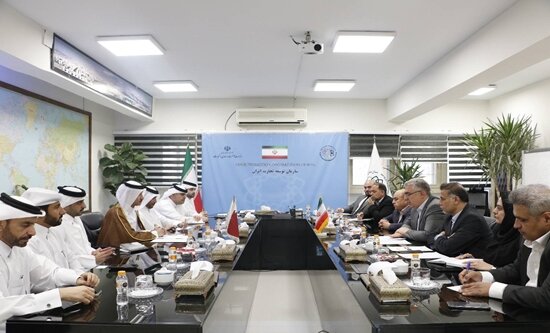Tehran, Doha discuss boosting bilateral trade

TEHRAN - Head of Iran’s Trade Promotion Organization (TPO) Mohammad-Ali Dehqan Dehnavi met with Qatar’s Customs Authority Chief Ahmed Al-Jamal, on the sidelines of Iran Expo 2025, stressing the need to enhance commercial ties and develop trade infrastructure to increase bilateral trade volume.
According to the TPO's public relations office, Dehnavi described Iran-Qatar economic and trade relations as growing and highlighted the potential for customs cooperation to accelerate trade.
He said the TPO stands ready to coordinate with other Iranian agencies to follow up on key issues and push them toward implementation.
Pointing to the geographical proximity between the two countries, Dehnavi said Iran and Qatar possess complementary trade capacities and noted that customs agencies would serve as the gateway to deeper commercial cooperation.
For his part, Al-Jamal voiced Qatar’s strong interest in expanding trade with Iran. He said the upward trajectory in commercial exchanges could also foster stronger political relations, pointing out that Iranian products have long held a special place in the Qatari market.
Al-Jamal emphasized that Qatar has already implemented measures to facilitate the entry of Iranian goods and believes the current trade volume falls short of its potential, given the strong demand among Qatari traders for Iranian products.
Also, Qatar’s Customs Authority chief met with the head of the Islamic Republic of Iran Customs Administration (IRICA) and other senior Iranian customs officials, in Tehran on May 11, to discuss ways to expand bilateral cooperation and share experiences aimed at facilitating and developing trade.
According to the IRICA, the two sides explored strategies to enhance customs cooperation between the neighboring countries.
Foroud Asgari, Iran’s deputy economy minister and head of the Customs Administration, described the visit of Ahmed bin Abdullah Al-Jamal and his accompanying delegation as highly significant, citing the friendly ties between Iran and Qatar.
During the meeting, Asgari briefed the Qatari delegation on Iran’s customs operations, emphasizing that all procedural formalities in the country are now handled through electronic systems.
Ahmed bin Abdullah Al-Jamal praised Iran’s digital customs processes and expressed Qatar’s interest in expanding cooperation with Iran. He noted that the broader political and diplomatic alignment between the two nations offers a valuable opportunity to deepen customs collaboration.
Al-Jamal also took particular interest in Iran’s risk management system, which Asgari further elaborated on during the talks.
Asgari called on the Qatari side to expedite the clearance of Iranian shipments—especially perishable goods—at Al-Ruwais Port, and voiced Iran’s readiness to help resolve any related challenges.
The meeting aimed to promote mutual cooperation in areas such as trade facilitation, combating smuggling and customs violations, the secure exchange of electronic customs data, and the organization of joint training programs.
The two sides also agreed to conduct regular joint inspections of ports and customs facilities and to hold periodic meetings between their customs officials to ensure close coordination.
The 10th Iran-Qatar Joint Economic Committee meeting concluded on December 12, 2024, in Doha, with officials from both nations pledging to enhance bilateral economic ties and increase trade to $1.0 billion annually.
The meeting, co-chaired by Iran's Minister of Energy Abbas Ali-Abadi and Qatar's Minister of Commerce and Industry Sheikh Faisal bin Thani bin Faisal Al Thani, focused on expanding cooperation across multiple sectors, including energy, infrastructure, and trade.
The event featured four specialized committees: Trade (covering commerce, banking, and insurance), Infrastructure (transport, agriculture, and ICT), Social and Cultural (tourism, health, and research), and Energy (water, electricity, oil, and gas). Over 60 representatives from public and private sectors of both countries participated in the discussions.
Ali-Abadi emphasized the strategic importance of the partnership, saying, "Today's economic relations between Iran and Qatar require a strategic outlook." He noted that current trade between the two countries stands at approximately $200 million annually, with plans to increase it fivefold to $1 billion in the near future.
The official further highlighted a significant energy project involving a 200-kilometer undersea power line to connect Iran and Qatar's electricity networks. Initiated in March 2023, the feasibility study is in its final stages, with implementation set to follow approval.
"This project will revolutionize power transfer between the two nations during peak demand periods and enable electricity transit to third countries," Ali-Abadi stated.
He also expressed Iran's readiness to welcome Qatari investors, envisioning mutual investments of at least $1 billion annually. Key focus areas include energy, transport, free trade zones, tourism, healthcare, and agriculture.
The Iran-Qatar Joint Economic Committee, established in 1995, has facilitated significant achievements, particularly in water and electricity sectors. The 10th session underlined both nations' commitment to translating agreements into tangible outcomes and fostering regional cooperation.
At the end of the meeting, the two sides signed a comprehensive cooperation document to determine the framework of cooperation in the coming year.
Speaking in an online meeting with Saleh Alkhulaifi, the deputy Industry and Commerce minister of Qatar, in late November 2024, Mohammad-Ali Dehghan Dehnavi, the head of Iran’s Trade Promotion Organization (TPO), said that Iran seeks to reach one billion dollars in annual trade with Qatar.
Referring to the extensive political and cultural relations between the two countries, Dehghan Dehnavi said: "Despite the efforts of both sides, economic relations between Tehran and Doha have not reached the desired level."
“Fruits and food products are Iran’s top exported items to Qatar, and it cannot be expected that the trade between the two countries will exceed one billion dollars with the export of such products, the official said.
According to the TPO head, the challenges in developing trade with Qatar are clear, and Iran is trying to increase the volume of trade with Qatar by developing a well-considered and coherent work plan.
Alkhulaifi for his part stated that the strict customs regulations in Qatar affect all countries, saying: "We will work to expedite the clearance of Iranian goods from Qatari ports and issue visas to Iranian businessmen, and we hope that the prospect of a billion-dollar trade between the two countries will be realized in the near future."
EF/MA
Leave a Comment